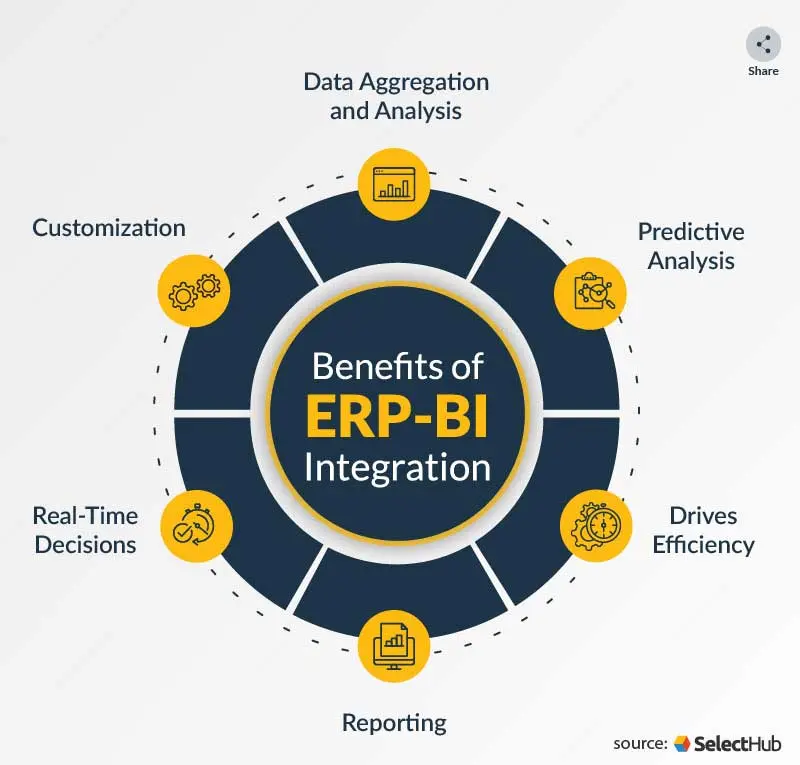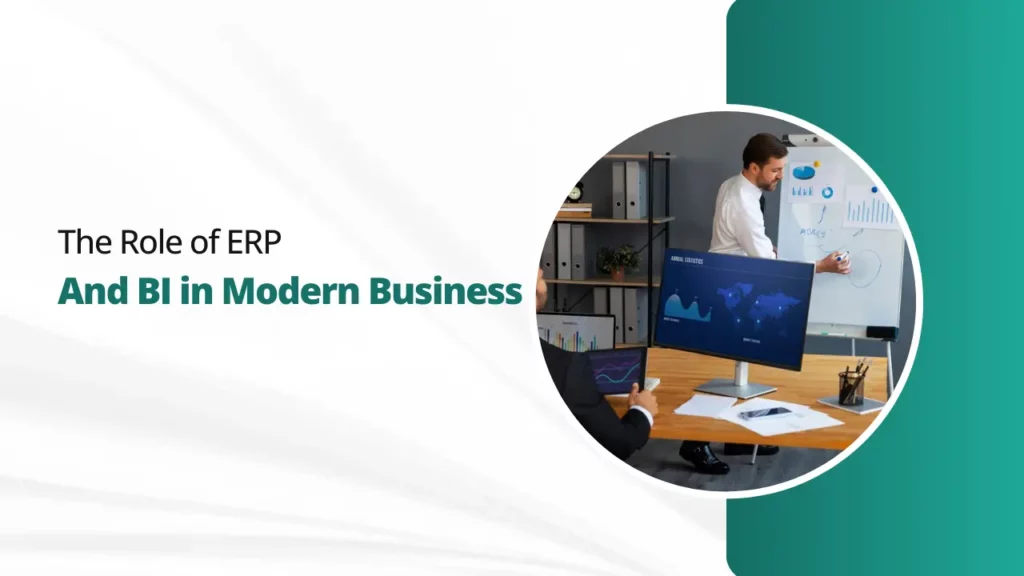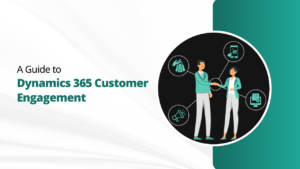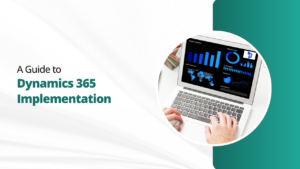ERP and BI are two dynamic tools that play a functional role in shaping the future of enterprises. ERP systems serve as the backbone for managing core business processes. On the other hand, BI helps businesses to transform raw data into actionable insights. Together, ERP and BI form a powerful combination that is redefining the way companies succeed. In this guide, we’ll explore the integral role of ERP and BI in contemporary business. We will also unpack how their integration can drive efficiency and innovation.
ERP – The Nerve Center of Operations
ERP serves as the central nervous system of a business. It provides a unified platform for managing and optimizing business processes. ERP systems integrate functions such as finance, HR, supply chain, and more. It breaks down operational silos and fosters cross-functional collaboration.
Regulates Operations for Efficiency:
ERP’s primary function is to streamline operations by automating routine tasks. It also reduces manual errors and improves efficiency. From automating payroll to optimizing inventory management, ERP brings coherence to disparate functions. It allows businesses to operate with agility and precision.
Breaking Down Silos:
One of the advantages of ERP is its ability to provide a view of the organization’s operations. It consolidates data from different departments into a centralized database. ERP enables decision-makers to access real-time information. It also fosters a more comprehensive understanding of the business landscape.
Cost Reduction through Optimization:
Through process automation and data-driven insights, ERP contributes to cost reduction. It optimizes workflows, minimizes excess inventory, and enhances resource allocation. Businesses can achieve significant savings, improving their bottom line and resource usage.
Business Intelligence – Transforming Data into Actionable Insights
Business Intelligence (BI) is the key to unlocking the power of data. BI tools collect, analyze, and visualize data from various sources. It transforms raw information into actionable insights that drive informed decision-making.
Using Data for Competitive Advantage
BI tools empower organizations to turn raw data into actionable insights. It is used for data visualization, reporting, and analytics. Businesses gain a competitive advantage by making informed decisions based on market trends.
Real-Time Analytics
In the era of rapid decision-making, real-time analytics provided by BI are invaluable. Businesses can track key performance indicators (KPIs). It enables swift responses to market changes and identifies emerging trends.
Predictive Modeling for Future Success
BI’s predictive modeling capabilities allow businesses to forecast future scenarios. This forward-looking approach aids in proactive decision-making. It helps organizations to expect market shifts and stay ahead of the competition.
ERP and BI Integration

The true magic unfolds when ERP and BI systems integrate It creates a symbiotic relationship that enhances the capabilities of both. This integration allows for a smooth flow of data between different business functions. It also establishes a comprehensive ecosystem for informed decision-making.
Comprehensive Data Ecosystem
ERP and BI integration results in a data ecosystem where data flows between operational systems and analytical tools. This unified approach ensures that decision-makers have access to accurate and up-to-date information. This facilitates more informed and strategic choices.
BI Extracts Insights from ERP Data
BI tools extract valuable insights from the vast data pool ERP systems manage. This includes performance metrics, customer data, and operational trends. The integration allows for a 360-degree view of the business. It enables executives to make decisions that align with organizational goals and objectives.
Improved Decision-Making Across Functions
The integration of ERP and BI breaks down communication barriers between departments. It ensures that decision-makers have a shared understanding of the business. So, decisions become more holistic, considering the impact on the entire organization.
Enhanced Decision-Making
The integration of ERP and BI streamlines operations and elevates decision-making. With real-time data at their fingertips, decision-makers can identify trends. They can forecast future scenarios and make data-driven decisions.
Moving Beyond Reactive Decision-Making
Traditional decision-making often relies on historical data and retrospective analysis. ERP and BI integration provides real-time insights and predictive analytics. This shift allows organizations to respond to market changes and emerging opportunities.
Strategic Planning with Real-Time Data
Strategic planning becomes more effective when informed by real-time data. ERP and BI integration equips organizations with different tools. These develop and adjust strategies based on current market conditions. It also ensures that business decisions align with the dynamic nature of the market.
360-degree View for Comprehensive Decision-Making
ERP and BI integration facilitates a comprehensive view of the business landscape. It enables decision-makers to consider the impact of their choices across the organization. This 360-degree perspective is crucial for making decisions. It contributes to sustained growth rather than isolated departmental gains.
The Future of Business
As technology evolves, ERP and BI are at the forefront of driving innovation. AI-powered analytics provides machine learning algorithms that predict market trends. Businesses can use ERP and BI to navigate the complexities of the business landscape.
AI and Machine Learning in BI
Incorporating AI and machine learning into BI tools takes data analysis to the next level. AI algorithms can identify patterns, detect anomalies, and provide insights. This capability is invaluable for businesses seeking to stay ahead.
IoT Integration for Real-Time Monitoring
The IoT is another frontier where ERP and BI are making significant contributions. Integrating IoT data into ERP systems allows for real-time monitoring of equipment. This level of visibility enhances decision-making by providing timely performance information.
Cloud-Based Solutions for Flexibility
The Cloud-based ERP and BI solutions add a layer of flexibility to modern business. Cloud computing enables remote access to data. It facilitates collaboration among dispersed teams. It also ensures scalability to accommodate the evolving needs of the company.
Conclusion:
In conclusion, the role of ERP and BI in modern business is pivotal and transformative. ERP streamlines operations and BI provides actionable insights. Companies can unlock a new level of efficiency by integrating ERP and BI. The integration of these two systems propels organizations into the future.
ERP and BI are best for your business, whether a small startup or a large enterprise. If you want expert solutions for integrating ERP and BI, contact us.




